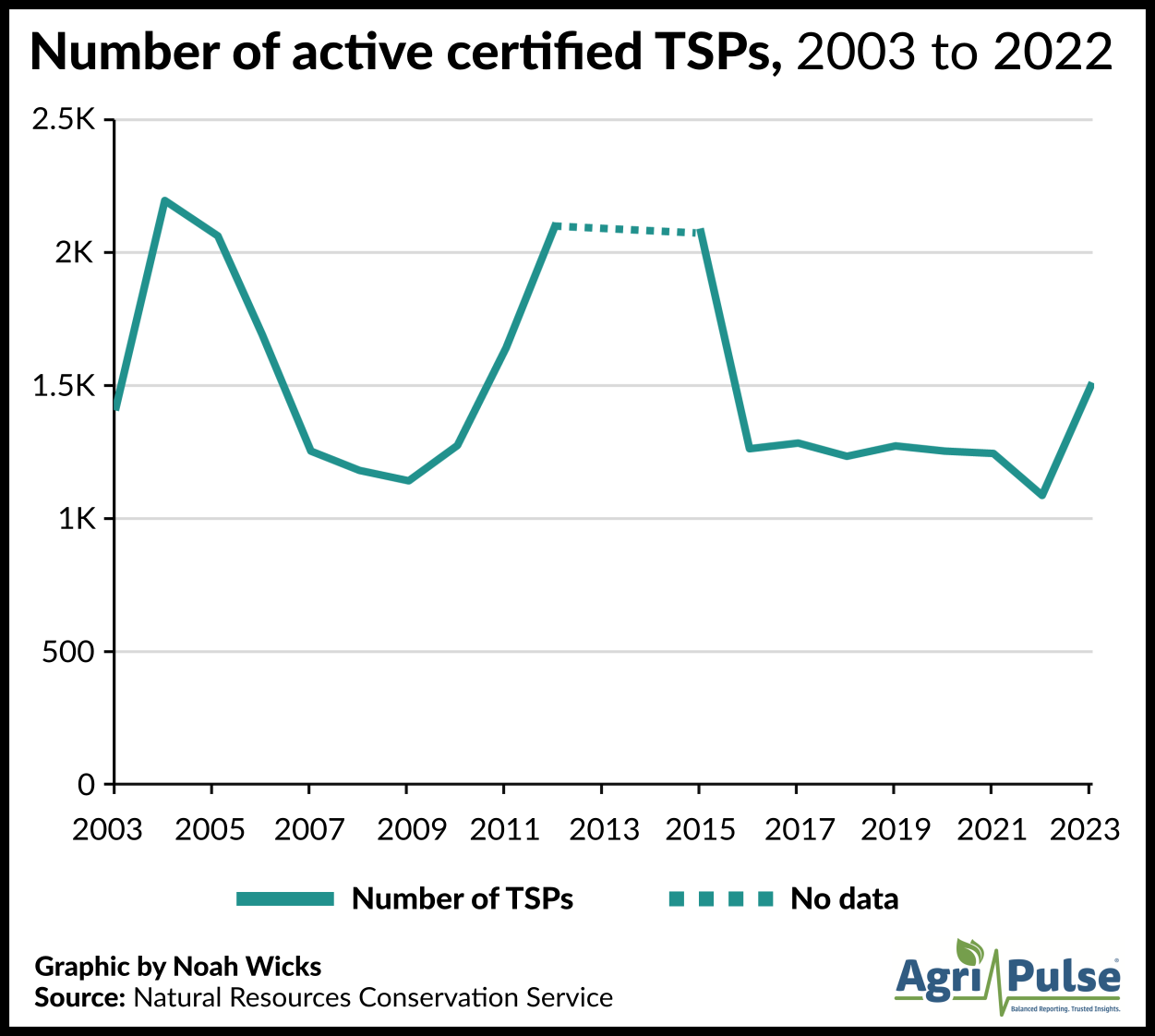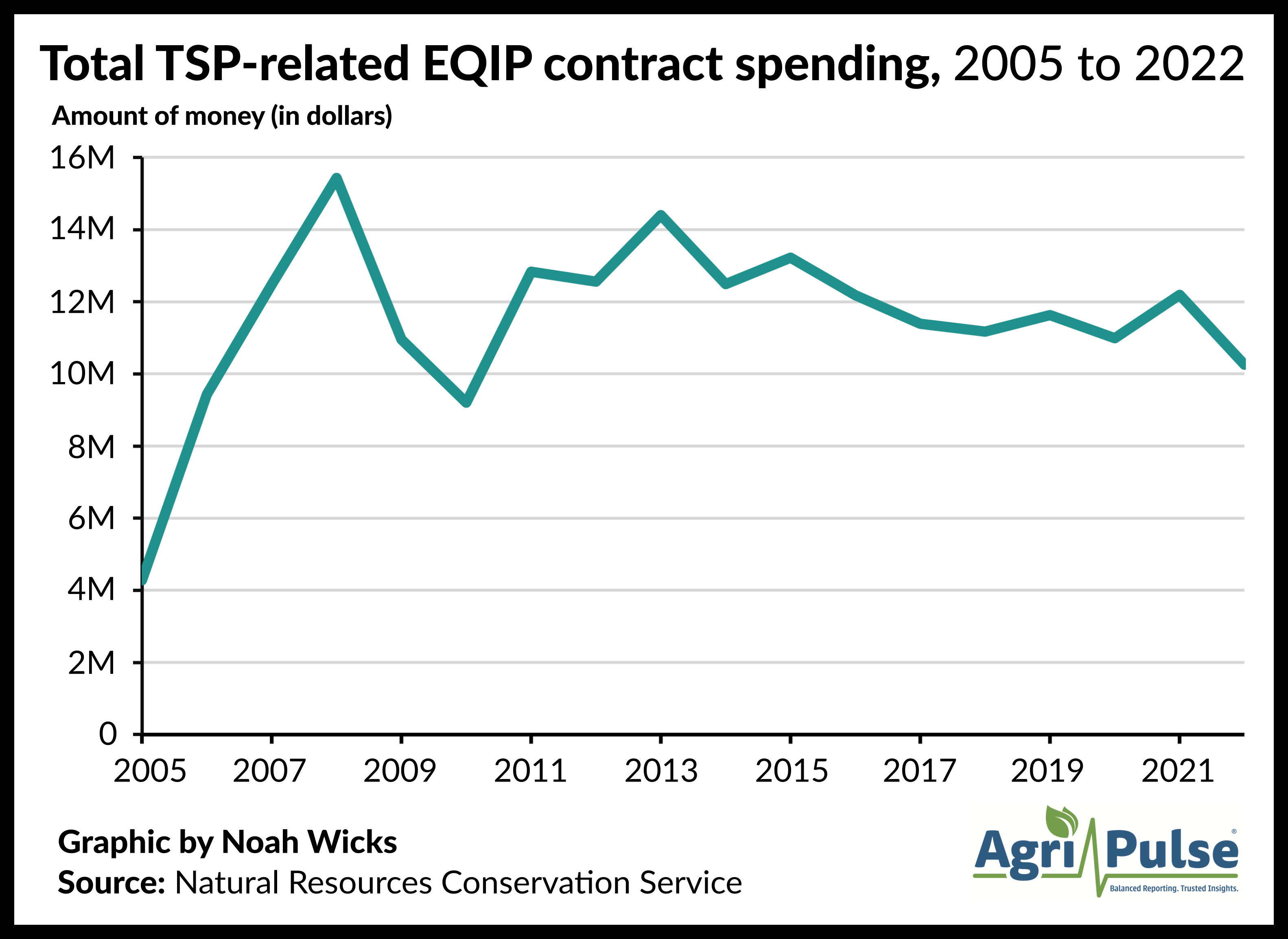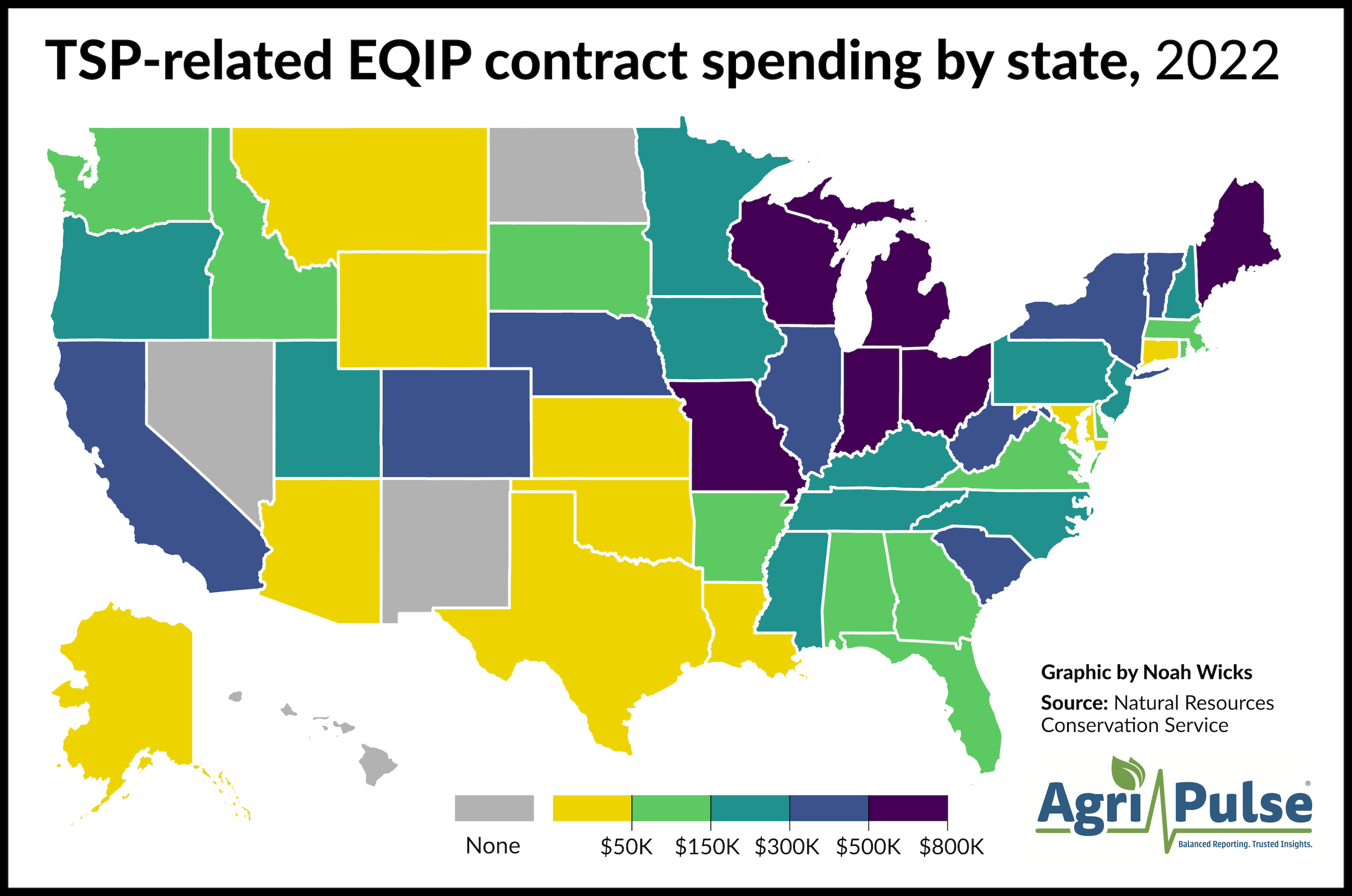The Agriculture Department's Natural Resources Conservation Service will likely need to look at ways to expand its roster of private sector experts to deliver conservation technical assistance as it struggles to meet its internal workforce needs while implementing an infusion of conservation funding from the Inflation Reduction Act.
Private sector conservation experts can help perform duties normally left to NRCS staff through the agency's Technical Service Provider program. These outside professionals, which help producers draft management plans and implement conservation practices, are certified by the NRCS, and their services are paid for by producers with the agency reimbursing portions of the cost.
NRCS Chief Terry Cosby told Agri-Pulse that meeting the demand expected to come from the $17 billion in increased conservation program funding provided by the IRA is going to require both in-agency and outside resources. The IRA also included an additional $1 billion in funding for conservation technical assistance.
"We have a very qualified staff, but we never have as many people as we need and we're never going to probably have that," Cosby said. "Right now it's all hands on deck. We have a huge network of partners that are going to be working alongside NRCS."
But some groups and lawmakers are concerned the current TSP program cannot attract the number of conservation specialists needed to fill the department’s future technical assistance needs.
House Ag Committee Chairman Glenn Thompson, R-Pa., went as far as to call the program “broken” in a farm bill hearing last September. Some have suggested tweaks that would allow specialists with existing professional certifications a simplified route through the application process, integrate experts affiliated with agricultural cooperatives more fully into the program and update reimbursement rates to cover the entirety of an expert’s work.
“It does not function the way it should,” Bruce Knight, a conservation policy consultant who served as chief of NRCS during the George W. Bush administration, said of the TSP program.
The number of active certified TSPs declined between 2019 and 2022, though significant increases in the first two months of 2023 have broken that trend, according to data acquired by Agri-Pulse through a Freedom of Information Act request. There are currently 1,498 active certified TSPs this year, while only 1,087 registered with the agency in 2022.

Knight told Agri-Pulse one challenge with the program is confusion within contracts for programs like the Environmental Quality Incentives Program about how the agency will reimburse TSP services. There also can be friction between NRCS agency staff and TSPs with overlapping duties. That issue frequently presents itself, Knight quipped, when it comes time to determine “who’s going to get to do the fun work and who’s going to be left with paperwork.”
TSPs often help producers draft management plans and design and implement conservation practices for farms. Their work ranges from helping map out a farmer's transition to organic to planning the use of more efficient irrigation systems.
Dennis Godar, who has been a certified TSP for the last 20 years, compared his profession's relationship with producers to citizens hiring tax professionals; farmers can draft their own management plans, but often prefer to have someone with expertise and experience help them.
“When you’re dealing with a regulatory agency, it’s sometimes good to have that consultant that knows what they’re doing to help you through it,” he told Agri-Pulse.
In their work with producers, TSPs frequently work with EQIP forest and nutrient management plans and complete agricultural energy audits, according to USDA data obtained by Agri-Pulse. Between 2011 and 2014, those certified to draft soil spill prevention, control and countermeasure conservation activity plans also saw demand for their services.
The majority of TSP projects captured in the USDA data, however, fell into the Technical Service Provider “certification,” “construction” and “design” categories, which did not specify the focus of the EQIP projects.
Conservation professionals looking to become TSPs must determine specializations and meet the criteria for each practice. Requirements include completion of courses on the agency’s online AgLearn learning management system, college degrees in certain areas, samples of previous work and previous experience in practice planning, design and installation.
Certifications from professional groups like the Society of American Foresters or the American Society of Agronomy can meet some criteria for the TSP process, but individuals are still required to take online courses to become TSPs. Certification must be renewed every three years, a process Godar said can be tedious and drive professionals away from the program.
“It’s almost like getting renewed from scratch every three years,” he said. “That’s really frustrating for a lot of TSPs and that’s one of the biggest reasons a lot of TSPs drop out of the program. It’s really burdensome.”
The American Society of Agronomy, the Crop Science Society of America and the Soil Science Society of America said in joint comments to NRCS in December that the program “is not meeting technical assistance needs and in many cases, does not provide value to the professional working in the TSP role.” The comment said the certification process is complicated, payments are “not adequate” and reporting requirements are overly extensive.
The groups asked NRCS to accept as TSPs applicants who are certified as crop advisers, professional soil scientists and wetland scientists, or who have other industry credentials, without any further training or requirements.
 Luther Smith, the chief administrative officer for all three groups, said they have been in discussions with USDA about changing the application process for those with professional certifications, which could be done through a memorandum of understanding.
Luther Smith, the chief administrative officer for all three groups, said they have been in discussions with USDA about changing the application process for those with professional certifications, which could be done through a memorandum of understanding.
“If someone isn’t performing, there’s recourse within our program to have them removed or have them not be a TSP,” Smith said. “It’s not like they have to accept everybody that just raises their hand. They have qualifications to lean on and a credential backing them.”
Don’t miss a beat! It’s easy to sign up for a FREE month of Agri-Pulse news! For the latest on what’s happening in Washington, D.C. and around the country in agriculture, just click here.
The groups also said materials provided through the current AgLearn platform are outdated, and TSPs should have the flexibility to submit plans outside the specific software program they are currently required to use. In addition, the groups feel payment for TSP services should be provided directly, and the NRCS should automatically renew TSPs who maintain certain professional certifications.
A report published by the Keith Campbell Foundation for the Environment proposed similar measures. Farmers are currently reimbursed for 75% to 90% of the costs for hiring a TSP under the agency’s cost-share rules, which the report says disadvantages TSPs competing with NRCS staff that cost producers nothing in the technical services marketplace. It also puts the burden of hiring a TSP on the shoulders of the producer, who must pay the difference or convince the TSP to discount its rates.
“Most of the participant-acquired TSP assistance is being limited to participants that have the financial means to pay both their share of conservation practice implementation costs as well as a share of the payment to the TSP,” the report states. “Otherwise, the TSP has to discount the value of their services. This introduces a systemic disparity for both the producer and the TSP.”

Land O’ Lakes, a farmer-owned cooperative that provides conservation-related services through its Truterra sustainability arm, has also called for NRCS to fully implement a 2018 farm bill provision allowing farmer-owned cooperatives and agriculture retailers to become TSPs.
“It’s really about expanding the reach of the conservation delivery system and working in partnership with NRCS and our ag retailers to expand that reach and to reach a new set of producers who maybe haven’t participated in conservation delivery programs before,” Matthew Wohlman, the vice president of government and industry affairs at Land O’ Lakes, told Agri-Pulse.
Wohlman said he was not aware of any Land O’ Lakes employees who are certified TSPs, though he said the company is having “direct conversations” with NRCS on how to certify employees as TSPs. The co-op is also exploring how the program could be updated in the upcoming farm bill.
For more news, go to www.Agri-Pulse.com.


